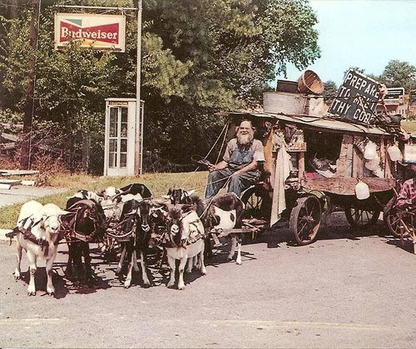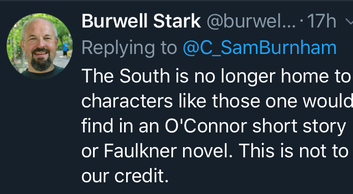|
Sam Burnham, Curator @C_Samurnham  Ches McCartney, The Legendary Georgia Goat Man Ches McCartney, The Legendary Georgia Goat Man James Calemine’s latest dispatch at Snake Nation Press has me thinking about the ways the world, specifically The South, has changed just during my lifetime. Change is inevitable, no doubt, and it is even beneficial at least some of the time. Some change really is progress. Some progress really is improvement. But the amazing photo of the Goat Man, a man out of time in his own era is an even more bizarre vision today. The man who is still a subject of stories and legends some 20 years after his death would likely have no place in our modern time. He was a native of Iowa who was once married to a Spanish knife thrower 10 years his senior. He left her and their sideshow act after the Depression broke them. An injury back in Iowa led to a religious conversion that, understandably, led him to Georgia. He’d leave out in that ramshackle wagon, pulled by his trusty team of goats and travel all over. He didn’t just wander Georgia. His stories are told in other states and he himself claimed he had visited all of the lower 48 states. He rarely bathed, he lived off goat milk and whatever else he came across. He wore goat skins and preached fiery messages of repentance in the makeshift revival services in every town he stopped in. He left his wooden plank signs, painted with repentance messages, nailed to trees and fence posts in his wake as he wandered. He was somewhere between a picture and a caricature of John the Baptist. In the long run, he was a character in a large story that is Southern Culture. He was one of many unique and odd folks who inspired a thousand characters in books and stories by people like William Faulkner, Flannery O’Connor, Eudora Welty, and others. People like the Goat Man made the Southern Gothic literary genre possible.  But today our roads are far too busy for a smelly old man on a goat wagon. Our towns are far too refined for his unkempt campsite. Our discourse is far too tolerant to tolerate his fiery sermons. We don’t have the time, the patience, or the curiosity to be bothered by him or his kind. But he’s not alone. Burwell Stark summed it up well on Twitter: “The South is no longer home to characters like those one would find in an O'Connor short story or Faulkner novel. This is not to our credit.” While there admittedly are still some wild characters to be found here and there, we’ve lost both the volume of them and the fascination we have for them. A man traveling the road in a goat wagon it a traffic hazard, a nuisance, he’s holding up progress, he’s not living in 2019. Do we ever ask ourselves if we’re making 2019 the kind of place we wish to inhabit? This is why we lack modern folk heroes. The Legendary Georgia Goat Man is one of thousands of characters we no longer have. He’s one of thousands we don’t currently deserve.
3 Comments
5/13/2019 02:45:25 pm
I remember when he used to come by my elementary school in Bellville Georgia, just West of Claxton in the early 1950’s. I can still remember the Sounds of the bells, cans, goats, creaking wheels and sundry other sounds . News of his arrival usually preceded him by at least 24 hours. The Goatman is coming! The Goatman is coming.
Reply
Ronnie
5/13/2019 09:40:12 pm
We would go out just north of Baxley on us1 we would take food for he an the goats. He was bigger than life to us kids an not make believe it was right in front of us. It’s sad all kids have is TV
Reply
Brian McCarthy
6/29/2019 03:44:00 pm
I moved to Fernandina in 1968 I heard stories of the goat man, but I believe I missed him. Thanks for keeping his sprite alive. Born in 1952 we had many of those folks in my hometown of Gloucester Mass. There was a man named Catnip Bill who live on his own and harvested the wild plant and sold it to the locals.
Reply
Leave a Reply. |
Sam B.Historian, self-proclaimed gentleman, agrarian-at-heart, & curator extraordinaire Social MediaCategories
All
Archives
November 2022
|




 RSS Feed
RSS Feed
